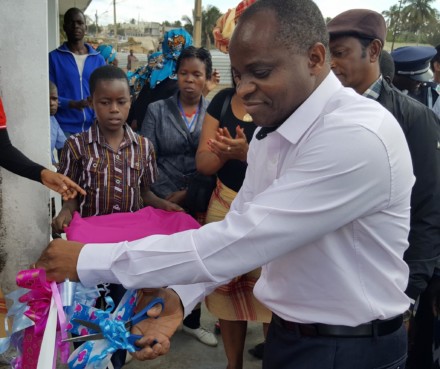4 October 2017
Nampula, Mozambique
Mahamudo Amurane
Profession
Politics & Governance
Motive
Governance targeting
Political dissent


Adolfo Olivas


Ahmed Divela


Amit Jethwa


Artan Cuku


Babita Deokaran


Bayo Ohu


Berta Cáceres


Bhupendra Veera


Bill Kayong


Boris Nemtsov


Boško Buha


Chai Boonthonglek


Charl Kinnear


Chut Wutty


Chynybek Aliev


Cihan Hayirsevener


Daphne Caruana Galizia


Darío Fernández


Derk Wiersum


Deyda Hydara


Édgar Quintero


Edmore Ndou


Edwin Dagua


Federico Del Prete


Fernando Villavicencio


Gezahegn Gebremeskel


Gilles Cistac


Habibur Mondal


Igor Alexandrov


Jacob Juma


Ján Kuciak


Javier Valdez


Joannah Stutchbury


José Ángel Flores


Jules Koum Koum


Kem Ley


Luis Marroquín


Mahamudo Amurane


Marcelo Rivera


María Elena Ferral Hernández


Marielle Franco


Milan Pantić


Milan Vukelić


Muhammad Khan


Nelson García


Nihal Perera


Oliver Ivanović


Orel Sambrano


Perween Rahman


Peter R. de Vries


Rajendra Singh


Salim Kancil


Sandeep Sharma


Sikhosiphi Radebe


Slaviša Krunić


Soe Moe Tun


Victor Mabunda


Virgil Săhleanu


Wayne Lotter


Yuniol Ramírez


Zezico Guajajara
4 October 2017
Nampula, Mozambique
Profession
Politics & Governance
Motive
Governance targeting
Political dissent
Mahamudo Amurane was elected as mayor of Nampula Municipal Council in 2013, standing for one of several opposition parties, the Democratic Movement of Mozambique (MDM). Nampula is the largest urban centre in the north of Mozambique, with just over a million inhabitants.
Amurane was murdered in the evening of 4 October 2017 at his home in Namutequeliua, a suburb a few kilometres from the city centre. He died from gunshot wounds inflicted by assailants who remain unidentified.
Born in 1973, Amurane was a graduate of the Catholic University of Minas Gerais in Brazil. During his career, he had worked as an independent consultant in public-sector management. He also taught in universities in Mozambique.
A few months before his death, after an apparent dispute with senior party members, he had announced his intention to step down from the MDM and that he would stand for a second term in the municipal elections the following year, but as the head of a new political formation. Amurane had had a ‘public row’ with the MDM president, Daviz Simango – a dispute that led to suspicions that the MDM was involved in the murder. However, at the time of writing there was no firm evidence that this was the case.
During the period that he led the municipal council, Amurane was well known for his intolerance of corruption. When he took over as mayor, the municipality was heavily in debt to suppliers of services and goods, and conflict over land was simmering. As a member of one of Mozambique’s main opposition parties, Amurane was forced to take hard measures to gain taxpayers’ and residents’ trust, so his administration set up a high-level management system, a consequence of which was that certain municipal officials were tried and convicted for their involvement in municipal corruption.
Furthermore, Amurane refused to divert resources from the city council to the MDM, for which it is probable that he faced threats and intimidation. Amurane found himself being hounded by reputed mafia bosses, who were no longer able to influence, and thereby gain from, public tenders in the municipal council. It is also public knowledge that, before his death, he had received threats from members of the MDM in the Nampula Municipal Assembly.
Entrepreneurs who had established a clientelist network in the council began to target Mayor Amurane, allegedly paying journalists to write reports to tarnish his image.
Amurane had a vision for a better city. He planned for improved infrastructure and services, and was credited for making the city of Nampula the cleanest in the country through a system for the treatment of solid waste. He developed new municipal infrastructure projects, including the construction and repair of roads, bridges and flyovers, and sustainable water programmes. He planned the construction of a circular road connecting the city centre with the suburbs. Another project that the mayor had for Nampula was the introduction of a municipal public-transport system.
He also introduced a participative budget, a planning tool that directly involves citizens in setting priorities for their residential areas. Moreover, Amurane empowered disadvantaged women by supporting them in creating entities that provided services to the municipality.
Faizal Ibramugy, head of the office of the Nampula mayor, told the author that Amurane was a person who defended integrity and honesty in everything that the council did, and he knew, he said, that Amurane had provoked certain well-connected elites within the public administration. Ibramugy confirmed that many entrepreneurs had tried to influence Amurane with money in a bid to approve projects linked to lucrative land access in the city.

Amurane accepting a civic award for community service

Amurane greeting colleagues as mayor
Days before he was murdered, Amurane had told his family that he sensed something was going to happen.
A year after Amurane’s murder, Mozambique’s National Criminal Investigation Service (SERNIC) said in a Maputo press conference that members of the MDM, including unnamed senior figures, were allegedly involved in the assassination, pointing to, but not confirming with hard evidence, a hand of the regime in the matter. The head of SERNIC’s public-relations department, Leonardo Simbine, said their investigations had led to the identification of 10 suspects, whom he did not name.
‘We found information that indicates the involvement of party members, including MDM senior party officials, among the accused,’ Simbine said. ‘Although this is preliminary, in that the investigations are not yet finished, and despite the presumption of innocence, we would like to share with you that we have ascertained [details] that indicate the involvement of members, including senior figures, of the MDM, and there are now 10 suspects,’ he said.
The case was referred to the provincial attorney of Nampula in October 2018, days before the municipal elections that Amurane would have contested.
Amurane left behind two children.
November 2022 update
On 2 November 2022, the Nampula Judicial Court sentenced Saíde Abdulremane, a former councillor, and Zainal Satar, a local businessman, to 20 and 23 years in prison for Amurane’s assassination. According to the Public Prosecutor’s Office, the two accused were responsible for shooting and killing Mahamudo Amurane and the murder was motivated by Amurane’s withdrawal of a document signed by Abdulremane granting the acquisition of space in the city centre to Satar. Despite the conviction, civil society groups claim that the masterminds have not yet been identified and justice has not been fully served.


16 January 2019
Accra, Ghana
Ahmed Divela


23 August 2021
Johannesburg, South Africa
Babita Deokaran


20 September 2009
Akowonjo, Lagos State, Nigeria
Bayo Ohu


18 September 2020
Cape Town, South Africa
Charl Kinnear


16 December 2004
Kanifing, Gambia
Deyda Hydara


22 April 2017
Beitbridge District, Zimbabwe
Edmore Ndou


21 April 2018
Johannesburg, South Africa
Gezahegn Gebremeskel


3 March 2015
Maputo, Mozambique
Gilles Cistac


5 May 2016
Nairobi, Kenya
Jacob Juma


15 July 2021
Kiambu, Kenya
Joannah Stutchbury


4 November 2011
Yaoundé, Cameroon
Jules Koum Koum


22 March 2016
Mbizana, Eastern Cape, South Africa
Sikhosiphi Radebe


10 January 2018
South Africa
Victor Mabunda


16 August 2017
Dar es Salaam, Tanzania
Wayne Lotter